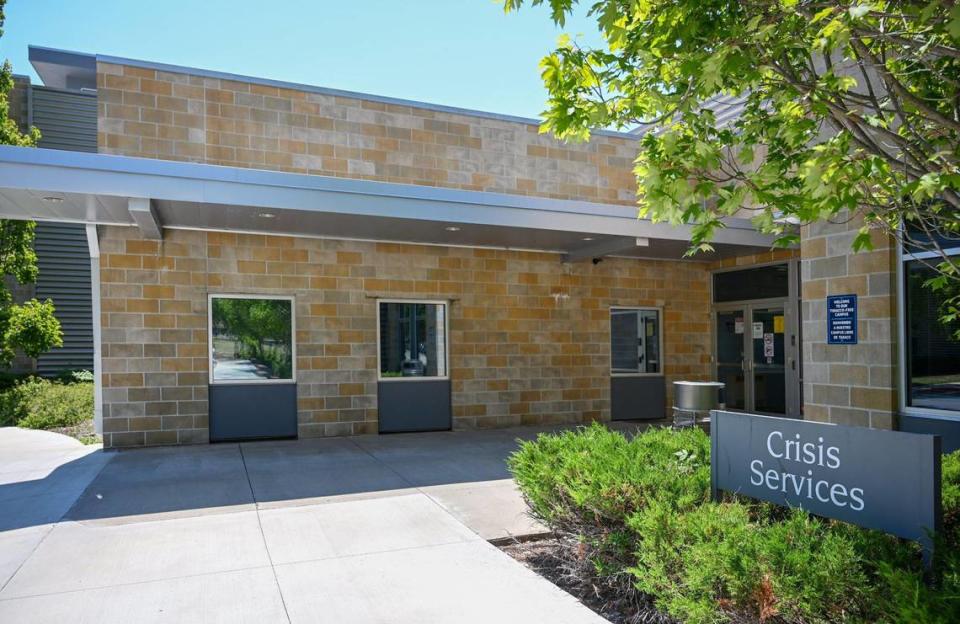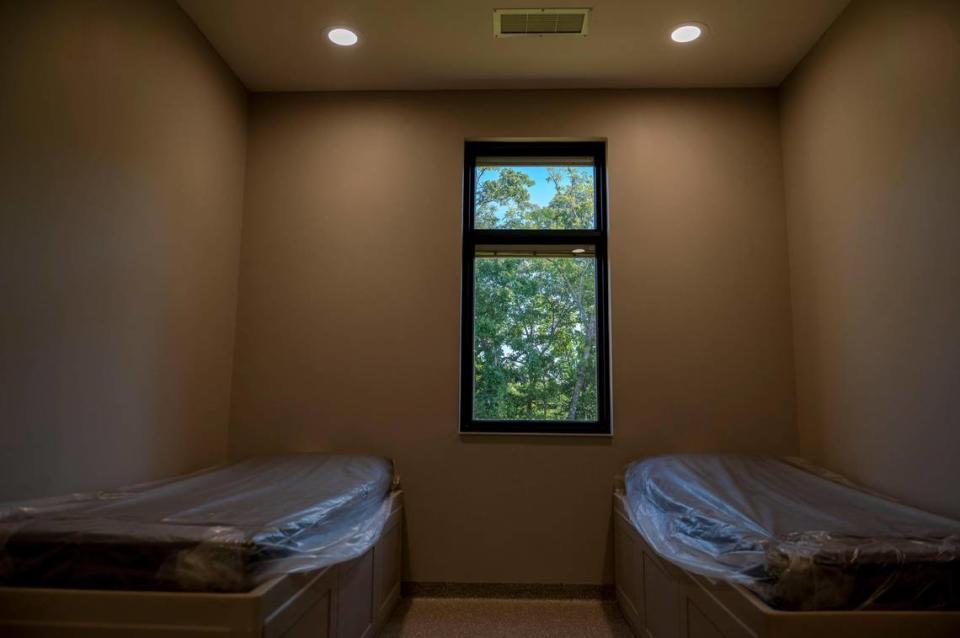Johnson County police handle more mental health calls. The nearest crisis center is in KCK
In the past year, Overland Park police officer Justin Shepherd has responded to mental health calls including a homeless man experiencing hallucinations and another person who was having thoughts of self-harm.
But Shepherd has few options for getting someone in distress the help they need. Only two options are available 24 hours a day for people without insurance: take them to a hospital emergency room or to the crisis center in Kansas City, Kansas.
Many mental health advocates as well as police say Johnson County needs its own crisis stabilization center. These facilities are typically short-term residential treatment centers that provide care for those in mental health crises.
Since 2017, the county’s crisis line has nearly doubled the number of calls it receives, from 17,684 to 32,234 in 2021.
In Lenexa, the number of mental health calls police are called to has increased by about 15% — from 884 in 2019 to 1,034 last year, Lenexa Police Department Capt. Wade Borchers said.
Mental health co-responders and crisis intervention training are good tools they can use, he said, but those don’t decrease the need for help because officers aren’t in a position to provide long-term assistance.
A local 24-hour facility that can involuntarily hold patients and provide services is essential for the county, Borchers and Shepherd said. People in crisis may not know what resources they need or where to get them, Shepherd added, and a Johnson County facility with a “no wrong door” policy would help people can get connected to the right resources.
At RSI, the crisis center in Kansas City, Kansas, 150 to 175 clients are triaged every month. About 25% of the clients are brought in by law enforcement, according to executive director Colene Medrano.
In the past 12 months, 40% of those taken to RSI by police were from Johnson County law enforcement agencies, said Randy Callstrom, president of Wyandot Behavioral Health Network.
RSI serves residents from Douglas, Johnson, Leavenworth and Wyandotte counties. Douglas County is opening its own center later this year.
A working group has been formed to assess Johnson County’s resources, but no decision has been made on whether a stabilization center is the right choice.
RSI serves multiple counties
RSI was originally the Rainbow Mental Health Facility, a state-run hospital, but was turned into a crisis stabilization center in 2014 using state funds that would have gone to the hospital.
The center is largely funded by the state. It has three units.
The sobering unit has six beds and patients can stay up to 23 hours for free. The observation unit includes eight recliners and patients can spend 23 hours there sleeping, relaxing and clearing their mind, said Medrano, the executive director. Patients can calm down in the low-stimulant environment where there are dim lights and no TV. The stabilization center serves up to 12 people with patients typically staying three to five days, but longer if needed.

When patients arrive, they can get hot meals, a shower and their clothes can be washed, Medrano said. A pharmacy is also on site.
But Shepherd said it can be difficult to convince someone in crisis to drive 20 or 30 minutes to the facility. They also have to agree to go voluntarily.
Anyone who refuses must go to the emergency room where they can be involuntarily admitted, Shepherd said, and that is a big strain.
“I hate to admit it, but we have a lot of involuntary circumstances we encounter throughout every week,” Shepherd said.
In 2017, Kansas passed the Crisis Intervention Act, which allows facilities like RSI to involuntarily hold patients for up to 72 hours. However, the regulations are not completed, so crisis intervention centers cannot yet involuntarily hold patients.
Even when the regulations are complete, Borchers said he thinks it would become overcapacity, adding to the need for Johnson County to have its own facility.

Community urges change
The Good Faith Network, an interfaith justice organization in Johnson County, is among the local groups calling for a crisis stabilization center in Johnson County, according to Ali Haynes, the pastor at Indian Heights United Methodist Church.
“A crisis stabilization center is the centerpiece of the crisis continuum,” Haynes said, adding that they are urging the county to have a center by 2025.
Emily Hage, the CEO of First Call, a substance abuse prevention and recovery organization, said first responders should be able to take people somewhere that fits their therapeutic needs. Otherwise, they can end up in the criminal justice system or the hospital.
In 2018, John Albers was in mental distress when a former Overland Park police officer responding to the welfare check shot and killed the 17 year old.
His mom Sheila Albers said opening a center “will save lives.”
“The thought of one opening here in the near future is phenomenal,” she said. “I think it’s probably one of the most positive things we’re doing in the county right now.”
Cindy Glaeser is the president of NAMI Johnson County, a mental health support and advocacy organization. She said she answers the nonprofit’s helpline and sometimes gets urgent calls from people who don’t know where to go.
Usually, she said, she directs them to the hospital, but said that is not always the best equipped place to handle mental health crises.
“Sometimes the people end up at the jail only because they’re so disruptive they can’t take them to the hospital. So sadly, the safe place for them is jail,” Glaeser said. “That’s very traumatic for someone in a mental health crisis and the jail is not equipped for it.”
Sometimes people just need a quiet place to calm down and access resources, Shepherd said. He added that people who are taken to the hospital end up with a bill for the visit.
Treatment and Recovery Center in Douglas County

Douglas County’s approach to a crisis stabilization center is called the Treatment and Recovery Center and is set to open in a few months.
There is an access center, observation unit and stabilization unit. Santana White, the director of operations, said the access center is like a walk-in urgent care center for mental health needs.
Unlike other facilities, it will be able to involuntarily hold patients. Dr. George Thompson, the medical and executive director, said they worked with the state and are using a different license that allows them to hold people before the state regulation is in place.
To keep everyone safe without feeling unwelcoming, there are wide counter tops to keep patients at a safe distance. Most of the chairs and tables don’t have sharp edges and are filled with sand so they can’t be picked up or thrown.

Patients can stay in the observation unit for up to 23 hours. The space was designed to help people manage substance withdrawal and keep them away from external triggers.
In the stabilization center, patients can stay for up to a few days.
White said if someone comes in seeking a service they don’t have, staff will direct them to it.
“The goal is to be able to make sure that we can funnel them back out to the appropriate places, because it’s going to reduce them going somewhere else that’s not going to be able to assist them, or their mental health going even further down the tank because they’re lost and confused,” White said.

Beginning steps in Johnson County
The Crisis Continuum of Care Workgroup was created this year and it is gathering data to analyze the county’s gaps, according to Mike Brouwer, Johnson County criminal justice coordinator.
The group, he said, is taking a measured approach to understand the spectrum of resources instead of diving head first into building a crisis center if it is not necessary.
“If you don’t focus on the entire continuum of care, then you’re missing a lot of opportunity to provide faster intervention earlier in the crisis,” Brouwer said.
Johnson County Commissioner Janee Hanzlick is involved in the workgroup and said she is aware of the need to fill mental health care gaps, but wants to carefully plan to ensure a facility would be beneficial long term.
“To just put up a center without having looked at the full spectrum of services, I think would be misguided,” Hanzlick said.
Becky Fast, another Johnson County Commissioner, said there needs to be discussions on how the project would be funded and built.
“We need to come together with our hospitals and maybe Olathe Medical Center has land (where it could be run),” Fast said.
Using several data collection tools, Brouwer said the group is working to understand and answer questions about if a facility is needed, what it would look like, its location and who would run it.
“It’s important to understand all the pieces connected together before we add very expensive and what could be very intrusive treatment to the clients we’re trying to serve,” Brouwer said.
The Star’s Aarón Torres contributed to this story.

 Yahoo Movies
Yahoo Movies 
